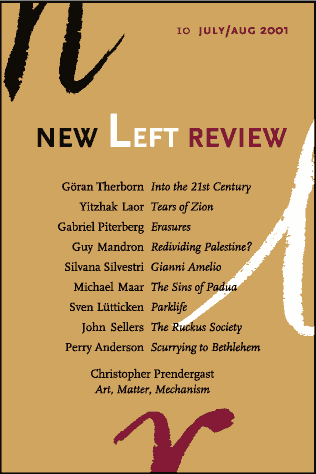Behind the second Intifada lies a century of conflict in Palestine. What are its roots, and what are its prospects? The Oslo Accords, the Israeli landscape and the Arab world.
How the founding myths of Israel dictated conceptual removal of Palestinians, during and after physical removal. The invention of ‘retroactive transfer’ and ‘present absentees’ as the glacial euphemisms of ethnic cleansing.
An oppositional intelligentsia at one with officialdom—so long as it wears the colours of Labour. An Israeli poet looks at the sanctimonies and sycophancies of a peace camp for foreign consumption.
Schemes for partition of the Holy Land have always been the fruit of manipulation and violence. What would an equitable division of the area between rival communities look like?
The operations and outlook of the Ruckus Society, leading conspirator behind the outrages at Seattle and elsewhere: America’s dynamo of direct action, in the vision of a key organizer.
States, markets, firms, classes, movements—how are they inter-related and where are they moving in the new century? Göran Therborn offers a panorama of global politics that amounts to a powerful and original alternative to all existing readings of the state of the world.
From the zoological garden, via the nature reserve and the theme-town, to the TV reality-show—sequences from the evolution of ‘parklife’. Disney and Waco, Sloterdijk and Deleuze, Spielberg and Smithson, as prisms for the fate of postmodern space.
Italian cinema has an heir to its greatest days: Gianni Amelio, whose films—rarely seen abroad—transform legacies from Rossellini and Antonioni, twisting personal and political themes into a distinctive high-tension cord of their own.
Deciphering the puzzle of Proust’s second visit to Italy, through a chimera of desire in his fiction: from chambermaid to valet, through tell-tale slips of idiom and signature tricks of speech.
In coolly proclaiming itself to be essentially the application of technique to matter, to what further consequences did modern art discover it was committing itself? Christopher Prendergast traces the ‘frightful clockwork of the world-structure’ in the games of Mallarmé, puppets of Flaubert and Kleist, musings of Mann, and the hurdy-gurdy of Cézanne overheard by T. J. Clark.
Peter Burke on Françoise Waquet, Latin or the Empire of a Sign. The first comprehensive study of the role of Europe’s dead language in the culture and social structure of the modern age.
Murray Sayle on Timon Screech, The Shogun’s Painted Culture: Fear and Creativity in the Japanese States 1760–1829. How painting, architecture, dress, topography were once mobilized to construct an official Japanese identity, and some analogies today.
Tony Wood on The Diaries of Nikolai Punin and N. N. Punin, Dnevniki. Pis’ma. The life and times of Russia’s leading theorist of the visual avant-garde, in times of war and revolution.
